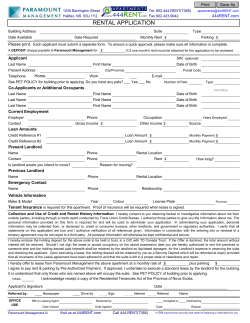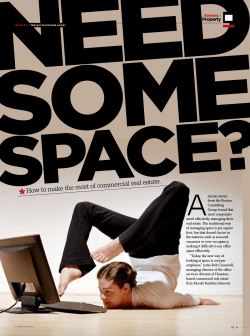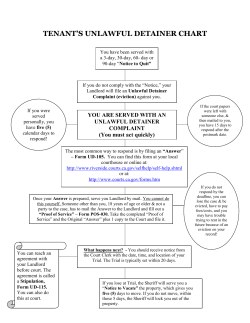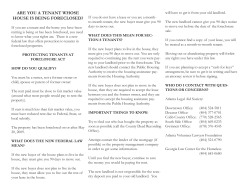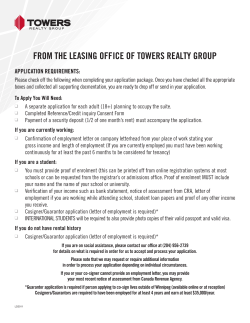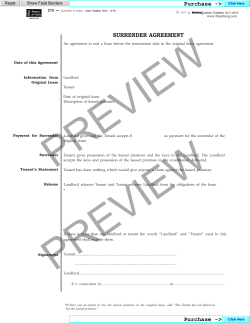
Document 203406
WORKBOOK HOW TO: Develop a good relationship with your landlord. ADVICE: How to calculate how much rent you should pay. WHY: A pop-up store could be an option for you. BY: Alexandra Middleton How to negotiate rent with your landlord Sky-high rental costs are a bugbear for many Australian retailers and can often make or break a business. Here are some tips and tricks on how you can hopefully chip away at your rates. Pick your battles Ranked as the third most expensive city in the world in which to rent a retail property, Sydney’s small business owners need to use every skill in their arsenal to negotiate an affordable rental rate. Owner of The Party People, Dean Salakas, leases three properties to run his party supplies business and says that having a good relationship and being reasonable with your landlord is key. “Compromise on the little things – like wearing the cost of small repairs – so you can put your foot down on the bigger, more important issues, such as rent rates when it’s time to renew,” he suggests. “The landlord will respect your reasons for being firm on select positions.” Cut your landlord some slack Salakas signed the lease on his latest property two years ago. At the start of negotiations, Salakas says both he and the landlord were skeptical of one another. The three previous businesses in the premises had failed, so the landlord was understandably wary. Salakas says this trepidation was not helped by the fact that he wanted to make considerable structural changes to the property. “It was tough, neither party wanted to bend,” he says. Two years on and Salakas has invested considerable effort into building a relationship with his landlord. “We have paid rent on time and been flexible. We don’t call on the landlord for minor things, like broken lights. Occasionally, this means we cop a bit of cost attending to repairs that are the landlord’s responsibility, but it saves them time and when you do eventually ask for things, you can use that as leverage.” Salakas’ efforts paid off when he asked the landlord to pull down an internal wall that had only been built shortly before they signed their lease. The wall initially posed a perceived theft risk as people could easily walk down the stairs unseen, with products in hand. Salakas paid for a structural engineer out of his own pocket and agreed to pay to have the wall refitted if needed. “The landlord went out on a limb for us, because if we had defaulted and moved out, they would have been stuck,” he explains. Do the groundwork However, regardless of whether you are an established operator or are starting a new business, the same process of negotiation applies. First and foremost retailers need to do their market research. In NSW, all leases of three years or more are required to be registered. Retailers can refer to the Leasing Register to compare what other tenants are paying for a similar space. To determine how much rent you should pay, it’s essential for retailers to calculate how much revenue the business will turnover and the percentage of turnover they are willing to spend on rent. As a rule of thumb, retailers should commit no more than eight per cent of their turnover to rent. Australian Lease & Property Consultants’ Managing Director, Don Gilbert, says the biggest mistake retailers make is to think there is an emotional connection to negotiating a lease. “It’s a business arrangement. If a lease isn’t affordable, you need to walk away,” he says. If you have weighed up the pros and cons and are set on a particularly risky site, Gilbert says it’s best to negotiate shorter terms for your lease, with three rather than five yearly rent reviews. Retailers should also build market reviews into their lease, as this means that instead of having their rent increased by a fixed amount at each review period, the rent will increase or decrease based on how the market is performing. Compromise on the little things – like wearing the cost of small repairs – so you can put your foot down on the bigger, more important issues, such as rent rates. FOR LEASE POPPING OUT OF THE BOX Generally occupying vacant premises or traditionally non-retail spaces, pop-up stores are a great opportunity for retailers. Landlords will often welcome pop-ups as an interim measure to fll a currently unused space. Founder of Instant Retail and Pop-Up Shops Melbourne, Scott Williams says, “To have the premises inhabited again, even in the short term, is a good thing for the retailer, the landlord and the neighbourhood.” As pop-up store owners often want to set up straight Time is of the essence away, they generally don’t pay When it comes to renewing a lease, time is of the essence. Most rental agreements stipulate that the option to renew should be reviewed six months before the lease ends. However, Salakas recommends having this conversation one year out. “In that short a time period, you have no leverage because the landlord knows it’s not realistic for you to relocate the business within six months,” he says. “Again, it comes down to having a good rapport with your landlord so that they are happy to discuss the terms of the lease earlier.” If negotiations fail and you can’t come to an agreement with your landlord, Gilbert advises looking elsewhere. “There’s no point being tied to something that will keep sending you broke.” ••• the standard rental rate. “Usually they get a discounted rent because the landlord thinks some rent is better than none,” Williams says. “Negotiating a long-term lease often means there are certain formulae to apply in terms of what you pay, based on square metre and location. All that goes out the window with pop-up stores.” However, it can be diffcult to scout a pop-up store location. Many commercial spaces that are managed by an agent won’t oblige pop-up retailers because there’s nothing in it for the agent. “There isn’t the long-term fee structure for the agent, so often they see it as being more trouble than it’s worth,” POP-UP SHOP OPENING SOON warns Williams. Giftrap | 43
© Copyright 2025

